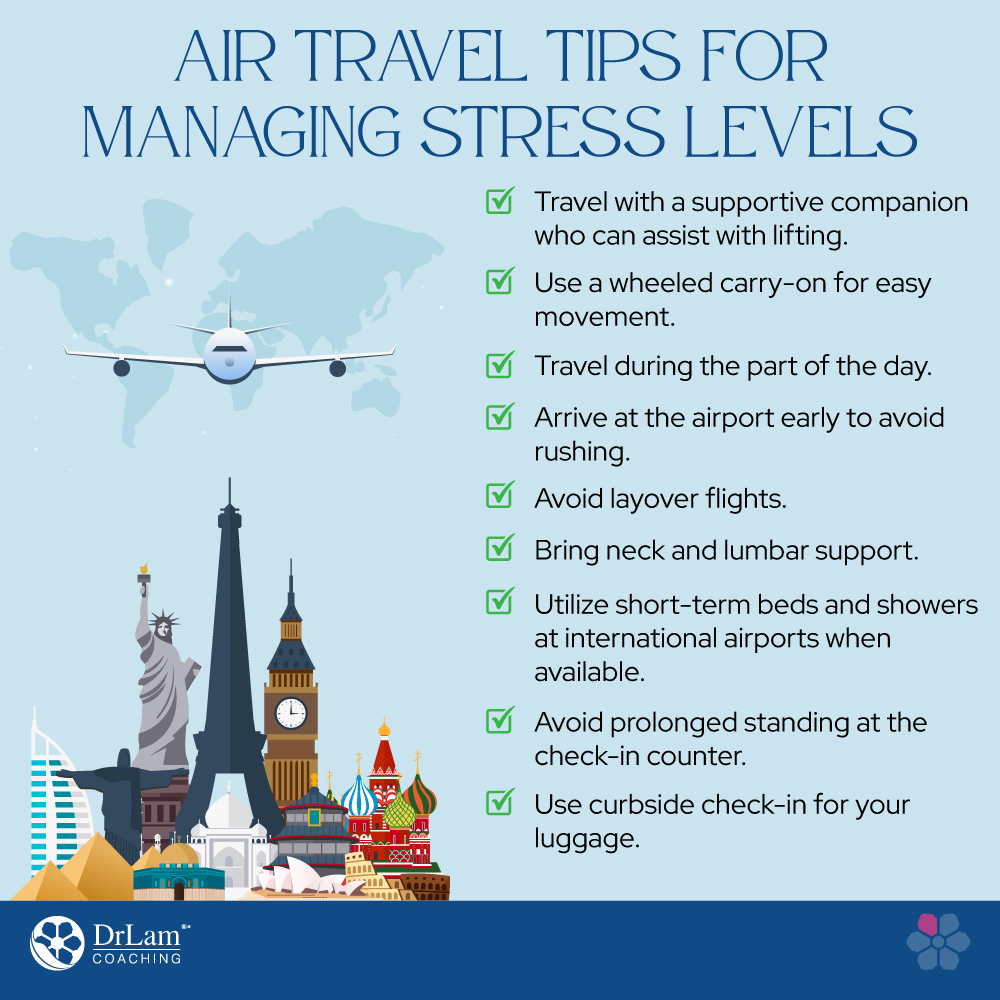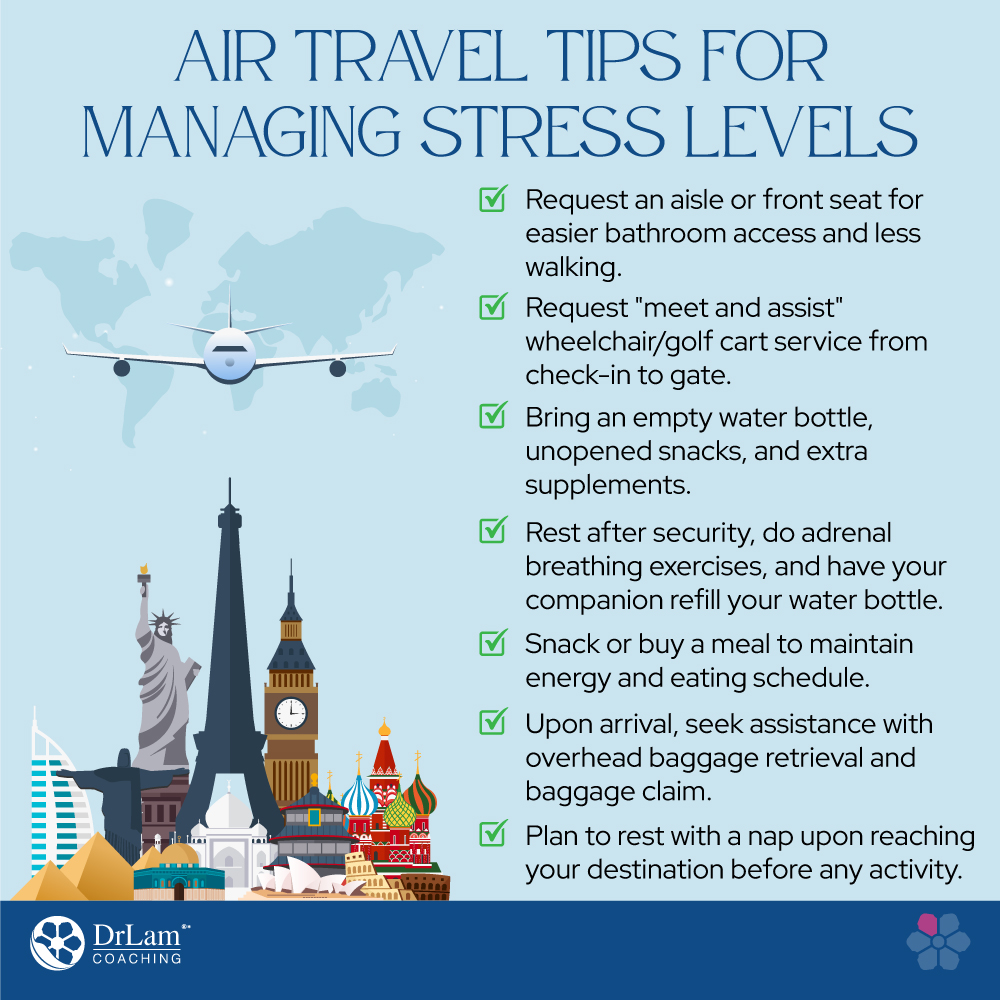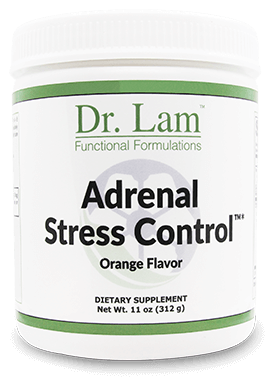 Summer is a time when many people take a break from the hustle and bustle of life and go on a vacation. The goal is to destress and hit the reboot button. However, it doesn't always help us relax as much as we hope. Summer travel can be a stressful ordeal, full of complex plans, precise timing, and uncomfortable seating. And it's not just stressful for your mind - it can be a stressor on your body too, leading to worsening symptoms of health issues like adrenal fatigue. No matter how well you prepare for it, there can be unexpected incidents beyond your control. But planning ahead to reduce stressors, support your health, and avoid worsening any health issues can go a long way toward keeping you healthy and happy on your trip.
Summer is a time when many people take a break from the hustle and bustle of life and go on a vacation. The goal is to destress and hit the reboot button. However, it doesn't always help us relax as much as we hope. Summer travel can be a stressful ordeal, full of complex plans, precise timing, and uncomfortable seating. And it's not just stressful for your mind - it can be a stressor on your body too, leading to worsening symptoms of health issues like adrenal fatigue. No matter how well you prepare for it, there can be unexpected incidents beyond your control. But planning ahead to reduce stressors, support your health, and avoid worsening any health issues can go a long way toward keeping you healthy and happy on your trip.
Research suggests that when you travel and break from your daily routine, you are much more likely to engage in unhealthy behaviors. This is because of the excitement of experiencing a new place and the challenges that come with it, such as sitting in a car or plane for many hours, trying to find food in an unfamiliar place, and finding yourself suddenly crunched for time.
The stress of summer travel can come from many places, both mental and physical. For example, traveling with grumpy children, or trying to make a connecting flight when your plane is late, are both mentally stressful. But sitting for hours in an uncomfortable position, or getting unexpectedly dehydrated in the summer sun can be physical stressors.
These can be particularly dangerous if you already have a medical condition, such as diabetes, heart problems, or adrenal fatigue. With Adrenal Fatigue Syndrome (AFS), the non-Addison's form of adrenal dysfunction, where your body's stress response is unable to keep up with life's chronic stressors, it’s important that you avoid stressors as you travel to minimize your risk of worsening symptoms.
However, if you plan ahead and make smart choices, you can avoid many of these travel pitfalls. First, it’s best to keep in mind any challenges you'll have, whether they are mental, medical, physical, or even relating to your travel companions before you head out on your trip. Plan how you’ll manage these challenges. Second, think about ways to make healthy food choices and get enough sleep and rest during your time away. We'll consider ways to address many different stressful summer travel challenges below.
The Centers for Disease Control and Prevention(CDC) has several tips on how you can protect yourself during your summer travel. These are measures you can take before, during, and after your travels to stay safe. These include the following:
Some places put you at a higher risk of contracting different diseases or food- or water-borne illnesses, and it is important to prepare for these ahead of time. You can visit the CDC’s destination pages to check for info on your destination. There, you can learn about any vaccines or medicines you may need before your trip. You can also get more info on any diseases or health risks that you should be aware of at your intended destination.
 If you are heading abroad, at least a month before heading out on your trip, see your doctor or a travel health specialist. At this appointment, the healthcare provider will give you destination-specific vaccines, medicines, and other health information that can help keep you safe. Also, you must be up-to-date on all of your routine vaccines that protect you from infectious diseases like measles. Many infectious diseases are not common in the United States, but they could be common at your intended destination, especially overseas. Additionally, share with your healthcare provider your health concerns, itinerary, and planned activities so that you can get particular advice and recommendations to help protect yourself.
If you are heading abroad, at least a month before heading out on your trip, see your doctor or a travel health specialist. At this appointment, the healthcare provider will give you destination-specific vaccines, medicines, and other health information that can help keep you safe. Also, you must be up-to-date on all of your routine vaccines that protect you from infectious diseases like measles. Many infectious diseases are not common in the United States, but they could be common at your intended destination, especially overseas. Additionally, share with your healthcare provider your health concerns, itinerary, and planned activities so that you can get particular advice and recommendations to help protect yourself.
Having a travel health kit ready for your summer travel with items such as your prescriptions and over-the-counter medications is beneficial. A situation may arise where you may need those items, and you may discover that it’s difficult to obtain them at your travel destination. Have enough to cover the length of your trip and even extra in case of travel delays. Furthermore, you may need other items such as a face mask, aloe, insect repellent, SPF15 or higher sunscreen, water disinfection tablets, alcohol-based hand sanitizer, and your health insurance card. Just be sure to check airline and customs regulations to ensure that you are allowed to bring your items.
If your summer travel will take you outside in the heat, you must know how to prevent, spot, and ameliorate heat-related illnesses. An article in the Journal of Travel Medicine suggests that travelers are at an increased risk of heat-related illnesses (HRI) and should be prepared. Traveling during summer months, near the equator, between 10 am and 4 pm, or at high altitudes also puts you at the highest risk for UV exposure. Some steps that you can take to protect yourself include the following steps:
In the event your summer travel includes water activities, exercise caution when boating, diving, or swimming. This is especially important if your stay is in a country where emergency services may not be readily available. Additionally, don’t go swimming in freshwater lakes or rivers. Infections like schistosomiasis and leptospirosis can spread by contact with fresh water.
Several types of bugs are more active during warm weather, including flies, mosquitoes, fleas, and ticks. During your summer travel, take the necessary steps, like using an insect repellent, to avoid bug bites. Some of the diseases that bugs can spread include dengue, malaria, chikungunya, yellow fever, Lyme, and Zika.
After your travels, if you feel sick, especially if you experience a fever, contact a healthcare provider right away and share pertinent details of your travel.
If you are heading out on a road trip, there are also some measures that you could take to help make your travel experience a good one.
 If your summer travel will be taking you on a road trip, you should get a tune-up on your vehicle. You want to ensure that you do not have any mechanical problems, the fluids should be topped off, the light bulbs should be functioning properly, and the tires should be in tip-top condition-- inflated to their manufacturer’s recommendations. This will ensure that you stay safe on the roadways as you travel. Also, remember to fill up your gas tank before you head out, make sure your wipers work well, and carry a spare tire.
If your summer travel will be taking you on a road trip, you should get a tune-up on your vehicle. You want to ensure that you do not have any mechanical problems, the fluids should be topped off, the light bulbs should be functioning properly, and the tires should be in tip-top condition-- inflated to their manufacturer’s recommendations. This will ensure that you stay safe on the roadways as you travel. Also, remember to fill up your gas tank before you head out, make sure your wipers work well, and carry a spare tire.
Having an emergency kit in your car for a road trip could come in handy. The National Highway Traffic Safety Administration recommends that you pack the following items:
Whether it’s prescription medications for yourself and your family or the family pets, don’t forget to pack them. Also, it’s a good idea to pack over-the-counter medications for certain conditions that you may experience, such as allergies, headaches/migraines, or minor aches and pains.
Be alert and pay attention to the roads and the names of streets. If you need to call 9-1-1 in an emergency, you can give directions to your location. Also, be aware of the location of urgent care centers and hospitals near your destination. Additionally, remember to take your insurance cards with you on your summer travel.
Be sure to get out and stretch regularly, walk around a bit, and get your blood flowing again. This is important for air travel too. Sitting for too long can worsen several health conditions.
It's tempting to try to see and do everything during summer travel, but too many activities can leave you exhausted. Incorporate rest and relaxation into your trip to keep things balanced. You can do this in several ways, including:

 Summer travel can act as a major stressor, and when your body already struggles to manage stress, it can worsen AFS symptoms. For many, traveling can be a grueling experience. Those with weaker adrenals have a greater risk of air travel, in particular, triggering an adrenal crash. However, there are some strategies for managing your stress levels while traveling. These can help you stay calm and prevent worsening symptoms. They include:
Summer travel can act as a major stressor, and when your body already struggles to manage stress, it can worsen AFS symptoms. For many, traveling can be a grueling experience. Those with weaker adrenals have a greater risk of air travel, in particular, triggering an adrenal crash. However, there are some strategies for managing your stress levels while traveling. These can help you stay calm and prevent worsening symptoms. They include:

Your summer travel may take you to a place that’s in a different time zone from your point of origin. Jet lag can contribute to the desynchronization of the circadian rhythm. This is particularly problematic for those with AFS, which already disrupts the body’s circadian rhythm and the sleep-wake cycle.
According to a study published in the journal Endocrine, it was concluded that cortisol and the circadian rhythm was disrupted after eastward travelers crossed more than five time zones. Also, the study showed that the cortisol circadian rhythm remained behind and synchronized with the western time.
The body’s Hormone Circuit of the NEM Stress Response model can become dysregulated when you travel across time zones, altering your hormonal patterns. Added stress and fatigue in people with adrenal fatigue can trigger the body to produce more of the hormone cortisol when their bodies try to adjust to a different time zone, leading to more serious AFS symptoms.
Tips for adjusting to different time zones include:
 Get daylight exposure to help reset your body’s internal clock. Light entering the eyes is the stimulus your body needs. Research findings indicate that bright daytime light enhances the amplitude of circadian rhythms.
Get daylight exposure to help reset your body’s internal clock. Light entering the eyes is the stimulus your body needs. Research findings indicate that bright daytime light enhances the amplitude of circadian rhythms.Many people struggle to stick to a diet or even find healthy foods while traveling. However, planning ahead can help you meet your nutrient needs and stick to a healthy diet during summer travel. A few tips that can help include:
It’s best to prepare for your summer travel to avoid many pitfalls that can stress you out and leave you feeling miserable and exhausted. Planning for any health conditions you may have, the difficulties of road trips or air travel, how to stick to a healthy diet, and how to make sure you get enough sleep and rest on your trip can make a big difference. All these aspects can affect whether you enjoy your vacation. Dr. Lam's Nutritional Adrenal Fatigue Recovery Program encompasses key elements for maintaining energy and adrenal health during summer travel, offering proprietary supplements, a comprehensive Adrenal Fatigue Syndrome eBook, video tutorials, diet and exercise guidelines, sleep improvement strategies, mobile-friendly online learning, and personalized support to ensure travelers can enjoy their journeys safely and healthily.

Helps fuel the energy needs of a stressed body
Bano-Otalora, Beatriz, et al. "Bright Daytime Light Enhances Circadian Amplitude in a Diurnal Mammal." Proceedings of the National Academy of Sciences of the United States of America, vol. 118, no. 22, 2021, e2100094118. https://doi.org/10.1073/pnas.2100094118.
Matsee, Wasin, et al. "Heat-Related Illnesses Are an Increasing Threat for Travelers to Hot Climate Destinations." Journal of Travel Medicine, vol. 30, no. 4, 2023, taad072. https://doi.org/10.1093/jtm/taad072.
Paragliola, Rosa M., et al. "Cortisol Circadian Rhythm and Jet-Lag Syndrome: Evaluation of Salivary Cortisol Rhythm in a Group of Eastward Travelers." Endocrine, vol. 73, no. 2, 2021, pp. 424-430. https://doi.org/10.1007/s12020-021-02621-4.
You can manage your adrenal fatigue on your summer travel by planning ahead to manage any medical issues that may arise, avoid potential problems with road or air travel, maintain a healthy diet on your trip, and incorporate time for rest and relaxation into your travel itinerary.